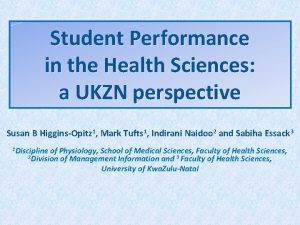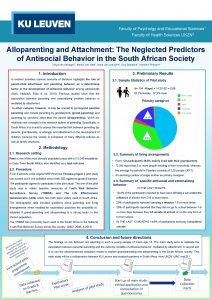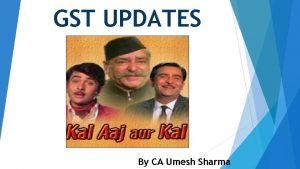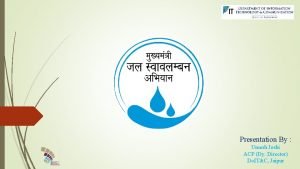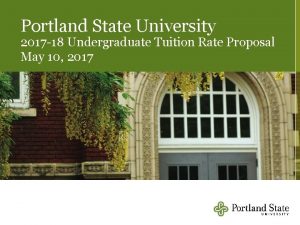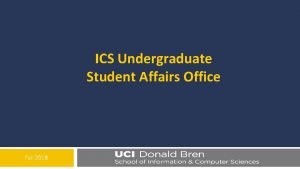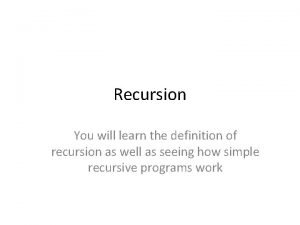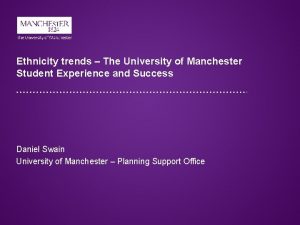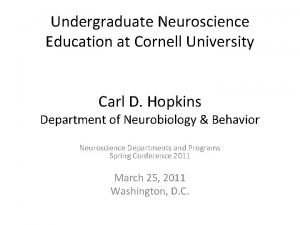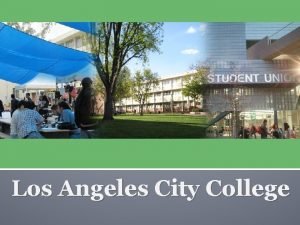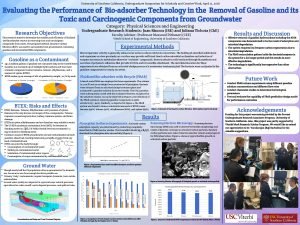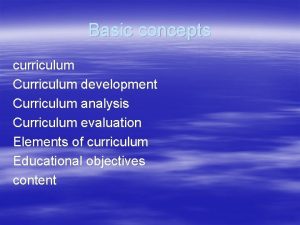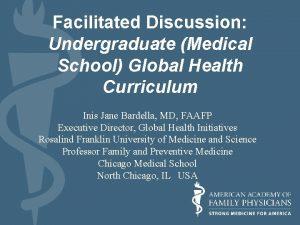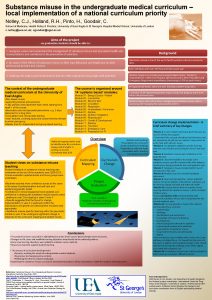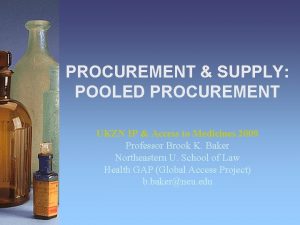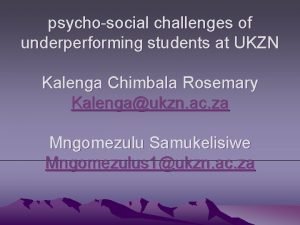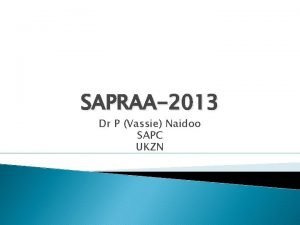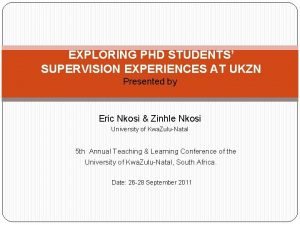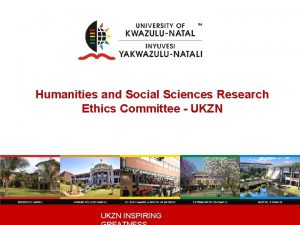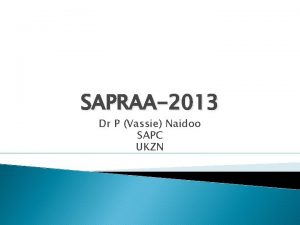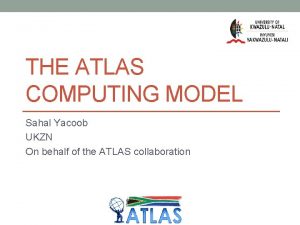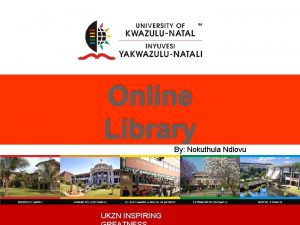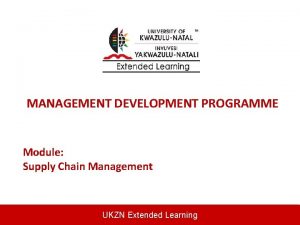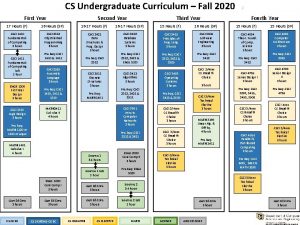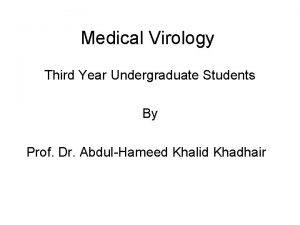The UKZN Undergraduate 6 year Medical Curriculum Umesh



















- Slides: 19

The UKZN Undergraduate 6 year Medical Curriculum Umesh Lalloo Nelson R Mandela School of Medicine

ATTRIBUTES OF MBCh. B GRADUATES • • • understand the fundamental principles and methods of medicine and apply the principles of research mastered the clinical skills required for diagnosis, prognosis and treatment promote the health of both individuals and communities treat physical and mental diseases at a PHC level behave in a manner and observe medical ethics expected by the medical profession acquired the foundations for life-long learning, and continued personal and intellectual growth engage in gainful economic activity with a commitment to professionalism and service manage themselves and the health care team

PRINCIPLES, DESIGN AND DELIVERY OF THE PROGRAMME Student centred (consider their needs and ability) Problem based (initially and emphasize clinical problems at exit level) Integrated and multidisciplinary Community orientated (experiential component conducted in the community setting) Early clinical contact Systematic (spiralling) (Concepts introduced in early years are revisited and expanded on later)

THE INSTRUCTIONAL METHODS AND TECHNIQUES USED Small group, problem-based learning. • Facilitators trained to help the group to analyse a problem/case • Interactive large group sessions (similar to lectures) • Practical sessions used to illustrate concepts or demonstrate specimens, images or functions related to the problem under investigation. •

MBCh. B 1 these modules are year long modules Basic and Foundation Science for Medicine • Becoming a professional • • Academic literacy (English for Medicine) • Isi. Zulu for Medicine • Computers for Medicine

MBCh. B 2 • First semester Homeostasis (Respiratory, CVS, Renal) Second semester Co-ordination and Control (GIT, Endocrine, skin genetics) Each semester has an introductory section of the applied basic sciences and pathologies relevant to themes with integration across disciplines •

MBCh. B 3 First semester Mental Health and neuromuscular problems • Second semester Reproduction, blood, Infections and HIV • Each semester has an introductory section of the applied basic sciences and pathologies relevant to themes with integration across disciplines

MBCh. B 4 First semester Internal Medicine • Second semester General Surgery Trauma and emergency care Family Medicine Obstetrics and gynaecology Paediatrics •

MBCh. B 5 First Semester Adult and Paediatric Medicine Mental Health • Second semester Principles of Surgery Obstetrics and gynaecology •

MBCh. B 6 Medicine Paediatrics Psychiatry Obstetrics and gynaecology Surgery Integrated Family and Public Health Medicine

STUDENT SELECTIVES allows students the opportunity to conduct research in a primary care/rural setting. supervised by local doctor or nurse expect to follow-up newly diagnosed HIV/TB patients for 3 years conduct an analysis of each site in terms of adherence to norms and standards as defined by Alma Ater, and present a community assessment of the socio-environmental drivers of illness, a health resource mapping of facilities for this community,

MONITORING & EVALUATION Reviewing the curriculum for core content Evaluating the lecture contents to prevent overload and instruction inappropriate for the level of training Matching assessment questions to objectives Avoiding over –assessing ( too frequent assessments) Assessment committee review has been established Reviewing functions in the Skills Laboratory

SUBCOMMITTEES SUPPORTING THE UNDERGRADUATE CURRICULUM • • Selective/Registration/Admissions Student support and monitoring Teaching, Learning and Year Coordinators Programmes, Rules, Templates Assessments, Monitoring, Examinations DP appeals and exclusions Selectives/Electives/Clinical Conference/ Outreach

NATIONAL SENIOR CERTIFICATE (GRADE 12) APPLICANTS Only candidates who sit for the Grade 12 examinations during the year of application will be considered ◦ The candidate must have achieved a minimum of 65% in each of the following subjects: Mathematics Physical Science Life Sciences English Must have at least level 4 pass in Life Orientation (legal requirement)

NATIONAL SENIOR CERTIFICATE (GRADE 12) APPLICANTS cont…. Applicants will be ranked in order of performance based on the following criteria ◦ The arithmetic average of 6 subjects including, Mathematics, Physical Science, Life Sciences and English. ◦ Mathematics paper 3 will not be substituted for Mathematics.

Pre-selection 50% of the seats reserved for Grade 12 learners will be allocated based on the marks obtained in the Grade 11 end of year examinations. ◦ The subject criteria will be as defined for ‘Grade 12’s/ Matriculants’above. 75% or greater aggregate in the end of year Grade 11 examinations will be considered for pre-selection. on academic merit and in compliance with the racial quotas as determined by the Board of the School of Medicine. ◦ Final award of places will be based on the applicant maintaining or exceeding this performance in the final Grade 12 (Matriculation) examination.

INTERNATIONAL STUDENTS The Nelson R Mandela School of Medicine is governed by a SADC agreement to accept applicants from countries without a medical school. Such applications are channeled via their respective Ministries.

MATURE STUDENTS Candidates who have completed the Matriculation/Grade 12 examination and exceeding the minimum standards for entry into the MBCh. B programme as defined above; and have done a year or more of a degree course at a recognised university in South Africa; and achieved outstanding results, will be considered. The Selection Committee shall consider a variety of courses to

MBCHB 5 & MBCHB 6 Admissions by Race & Gender A Grand Total Num % Num 2007 F 58 30% 5 3% 37 19% 0% 7 4% 107 M 47 24% 4 2% 33 17% 1 1% 3 2% 88 105 54% 9 5% 70 36% 1 1% 10 5% 195 2008 F 58 28% 5 2% 57 28% 0% 7 3% 127 M 48 23% 3 1% 25 12% 0% 4 2% 80 106 51% 8 4% 82 40% 0% 11 5% 207 2009 F 84 36% 4 2% 54 23% 0% 7 3% 149 M 52 23% 4 2% 24 10% 0% 2 1% 82 136 59% 8 3% 78 34% 0% 9 4% 231 2010 F 47 23% 3 1% 55 26% 1 0% 11 5% 117 M 49 24% 2 1% 37 18% 0% 3 1% 91 96 46% 5 2% 92 44% 1 0% 14 7% 208 2011 F 86 43% 10 5% 33 16% 0% 3 1% 132 M 60 30% 2 1% 8 4% 0% 0% 70 146 72% 12 6% 41 20% 0% 3 1% 202 589 56% 42 4% 363 35% 2 0% 47 5% 1043 2010 Total W % 2009 Total O Num 2008 Total I % Gender 2007 Total C Num Yr 2011 Total Grand Total
 Ukzn physiology modules
Ukzn physiology modules Psycholgy
Psycholgy Umesh v. vazirani
Umesh v. vazirani Quantum walk
Quantum walk Ca umesh sharma
Ca umesh sharma Umesh joshi
Umesh joshi Present tense of get
Present tense of get Umesh sharma md
Umesh sharma md Undergraduate meaninh
Undergraduate meaninh Portland state university undergraduate tuition and fees
Portland state university undergraduate tuition and fees Ics academic advising
Ics academic advising Undergraduate graduate postgraduate
Undergraduate graduate postgraduate Definition of undergraduate student
Definition of undergraduate student Victoria olsen
Victoria olsen Difference between postgraduate and undergraduate
Difference between postgraduate and undergraduate Difference between postgraduate and undergraduate
Difference between postgraduate and undergraduate Cornell neuroscience major
Cornell neuroscience major Los angeles city college
Los angeles city college Acadia university undergraduate programs
Acadia university undergraduate programs Usc undergraduate symposium
Usc undergraduate symposium
